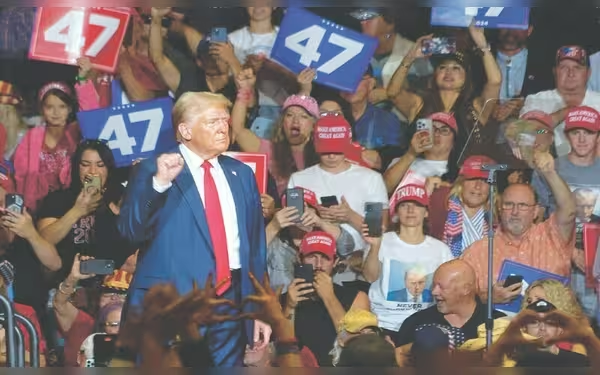Saturday, November 16, 2024 05:59 PM
Pakistani-American Committee Backs Trump, Citing Legislative Coup Against Imran Khan
- Pakistani-American committee endorses Trump for upcoming elections.
- Claims Biden administration influenced Imran Khan's ousting.
- Calls for a shift in U.S. foreign policy towards Pakistan.
 Image Credits: dawn.com
Image Credits: dawn.comPakistani-American committee endorses Trump, alleging Biden's role in Imran Khan's ousting amid political turmoil.
The political landscape in Pakistan has been tumultuous, especially in recent years. The ousting of Imran Khan, the founder of the Pakistan Tehreek-e-Insaf (PTI) party, has sparked significant debate and controversy. Khan, who was once the Prime Minister, was removed from office amid allegations of a ‘legislative coup’ that many believe was influenced by external forces, particularly during the Biden administration in the United States. This situation has led to various reactions from different groups, including the Pakistani-American community.
On Friday, the Pakistani-American Public Affairs Committee (PAKPAC USA) made headlines by endorsing Donald Trump, the Republican presidential candidate, for the upcoming elections on November 5. The committee's endorsement is rooted in their belief that the Biden administration played a role in the political upheaval that led to Khan's removal. They claim that the Pakistani government was coerced into executing a legislative coup against a leader who was both popular and democratically elected.
PAKPAC USA's statement reflects a growing sentiment among some Pakistani-Americans who feel that the current U.S. administration has not only failed to support democracy in Pakistan but has also contributed to the destabilization of the country’s political framework. The committee's endorsement of Trump suggests a desire for a shift in U.S. foreign policy towards Pakistan, one that they believe would be more favorable to democratic processes and the rule of law.
This endorsement is significant as it highlights the intersection of U.S. politics and Pakistani affairs, showcasing how international relations can impact domestic governance. The implications of such endorsements can be profound, influencing not only the political discourse within the Pakistani-American community but also potentially affecting U.S.-Pakistan relations in the future.
As the elections approach, it will be interesting to observe how this endorsement plays out and whether it resonates with a broader audience. The political dynamics in both the U.S. and Pakistan are complex, and the voices of the diaspora, such as those from PAKPAC USA, will undoubtedly contribute to the ongoing dialogue about democracy, governance, and international influence. Ultimately, the situation serves as a reminder of the interconnectedness of global politics and the importance of civic engagement in shaping the future.













